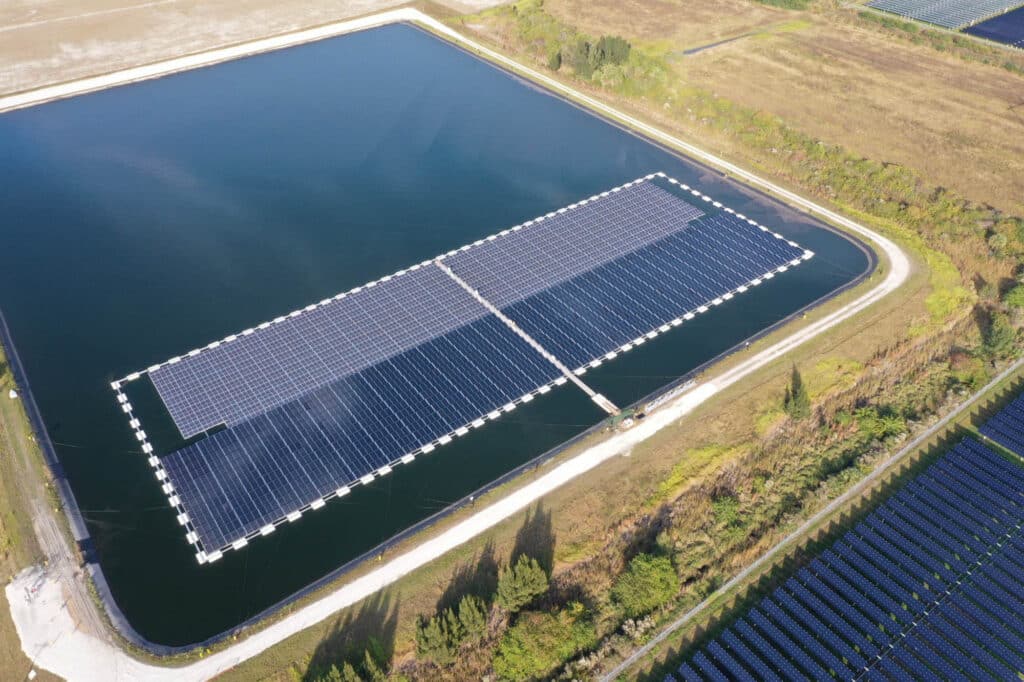When it comes to clean energy, there are various options to choose from. So how do you know if floating solar is right for you? Here are some things you should consider to determine if a floating solar array is the right clean energy system to suit your needs.
How Much Space Will It Take Up?
One of the main benefits of floating solar compared to traditional solar power is that it doesn’t take up any land space. Something that sets AccuSolar apart from other floating solar structures is its AccuDock technology that can be built to accommodate any solar panel regardless of the size or manufacturer. This
means that the amount of space it will take up depends entirely on your needs and your available surface area. For a general layout, each AccuSolar system takes up approximately 2.5 acres per megawatt (MW).
How Much Does It Cost?
Floating solar may have higher upfront costs than land-based solar arrays. This is primarily due to the specialized skill needed to install the systems and the extra materials used to put them in place. However, the increased efficiency and low maintenance required means floating solar structures will make up for the increased initial cost over time. Additionally, AccuSolar is making efforts to reduce the levelized cost of energy (LCOE) to be price competitive with ground mounted solar projects within the next 2 years.
How Much Power Does It Produce?
As you can imagine, the output of solar energy is highly dependent on external factors and the size and type of solar panel you use. AccuSolar’s current design utilizes panels generating 650W of power. In addition to the watt rating of your solar panels, the amount of power you generate will depend on the area covered, the amount of sunlight per day in your area and the way your system is positioned concerning the sun. At AccuSolar, we utilize the System Advisor Model (SAM) to determine expected output efficiencies at each location. Our team would be happy to work with you to evaluate if floating solar is right for your location.
What if It Breaks?
The good news is it shouldn’t break often! Thanks to AccuSolar’s innovative design and installation methods, the rate of microfractures — small fractures that are common in solar panels and can dramatically lower their efficiency — is greatly reduced. The chance that the platform itself will break is also very low due to the high-quality materials used in construction. There is no chance of the platform sinking thanks to the polystyrene foam that the platform is filled with for floatation. Even if it’s punctured, it won’t sink!
If there is some damage, the modular design of AccuSolar platforms makes it easy to repair specific sections of the system, ensuring the repairs are done as quickly and cost-effectively as possible.
What Is the Maintenance Like?
Floating solar structures often require less maintenance than their ground-mounted counterparts. There is no grass or vegetation to grow on the water and cover the system. Wear and tear is also reduced thanks to AccuSolar’s flat, streamlined design, which minimizes exposure to wind and water.
In terms of maintaining your solar panels, First Solar has a few recommendations to keep in mind:
- Panels should be inspected annually (at a minimum).
- Ensure that electrical connections are tight and free of corrosion.
- Solar panels should be cleaned using reverse osmosis (RO) water for best results. The water should have a total hardness less than 75 mg/L, a pH level between 6.5 and 8.5, the Chlorides should not exceed 250 mg/L, and the water conductivity should be less than 250 mS/cm.
- Pressurized water systems should not be used, as they can cause damage.
- If you are using a cloth to clean, ensure that the cloth is soft. No bristles, sponges, or squeegees should be used. Dry cleaning is allowed up to 12 times annually.
We recommend consulting your panel provider for the recommended maintenance practices for your solar panels.
Are There Warranties?
The solar panels you choose for your AccuSolar platform will come with their own manufacturer’s warranty. For insurance against defective panels, the warranties range from 10 years up to 25 years. Some will also guarantee a minimum power output for the panels for their warranty, assuring the customer that their panels will operate at a minimum of 80%-90% efficiency over 25 years. Of course, higher-quality solar panels also tend to come with more robust warranties.
As for the platform that AccuSolar provides, please refer to the AccuDock Warranty Terms and Conditions for details.
A floating solar array can provide benefits that no other source of clean energy can — saving land space, minimal maintenance and even lowering the evaporation rate of your water source. But taking the plunge into investing in floating solar is no small undertaking. If you feel like floating solar is the clean energy system for you, contact us and take the first step towards clean, cost-effective energy for your business today!





